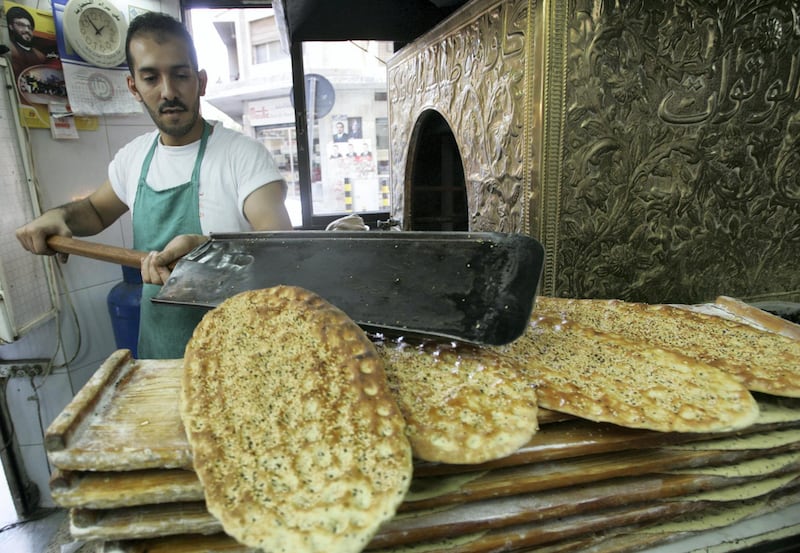Lebanese millers are warning of a national bread shortage and bakers plan to strike next week warning of an impending crisis caused by the recent dollar crunch.
Millers buy wheat from abroad in US dollars, grind it into flour locally and sell it in Lebanese pounds to bakers who then make the typical flat, round bread used in everyday Lebanese cuisine, as well as baguette-style bread, cakes and biscuits.
But these past few months, Lebanese banks have restricted access to dollars. ATMs have run out of cash and people must go to their bank in person to get money.
The dollar shortage is acutely felt by importers who operate with large amounts of money on a daily basis. Dollars and the local currency are used interchangeably in Lebanon since the civil war between 1975 and 1990.
In a press release published on Tuesday, a group of millers warned that from now on they would only accept US dollars from bakers for their flour. But they are fully aware that bakers, mostly paid in local Lebanese pounds, will be forced to try and do the same to regular customers or not be able to buy flour.
“Considering that they cannot pay in dollars, this could lead to a bread crisis,” read the statement. Wheat reserves for the country, normally at four months, have dropped to a month and a half.
In response, the Union of Bakery Owners said on Thursday that they would strike next week.
Bashar Boubess, CEO of Modern Mills, told The National that he was restricted, on average, to withdrawing around $10,000 a day, despite working with six banks and selling the equivalent of $100,000 a day of flour.
One solution for importers such as Mr Boubess has been to buy dollars on the black market where it can cost up to 10 per cent more than the official rate.
When the Union of Bakeries announced the strike for next Monday, the body’s head Kazem Ibrahim referred to the inflated price for dollars. “We cannot continue in this situation. ... We sell in Lebanese [pounds] and we must pay in dollars, so how can we buy the dollar for LL1,600,” he asked.
But the increased cost has angered importers and they are not the only ones facing a crisis.
In late September, gas station workers went on strike for a day, causing massive traffic jams as the Lebanese rushed to fill their tanks.
Importers wield significant power because the Lebanese economy depends on imports for its local consumption. Last year, Lebanon’s trade deficit reached $17 billion.
But the government is insistent that they will maintain the exchange rate, fixed since 1997 at 1507.5 Lebanese pounds to a dollar. It has become a symbol of the stability of the local currency.
A devaluation would provoke panic and push the small country, which is already struggling with the world’s third-highest debt to GDP ratio at 150 per cent, deep into a financial crisis.
In early October, the central bank stepped in with a mechanism that guarantees the official exchange rate to importers of three sensitive products – wheat, medicine and fuel – as long as they open letters of credit.
Wheat importers complain that this is a complicated and expensive procedure that requires depositing 15 per cent of the total amount in dollars.
Securing this amount, which can reach tens of thousands of dollars, can be difficult considering that banks restrict their access in the first place.
“I have worked in the flour business since 1980 and I never had to open a letter of credit,” said Mr Boubess. Normally, he operates with a “cash against documents” scheme: he brings the necessary documents to the bank to prove his import and then receives the cash in return.
Mr Boubess wants the central bank to allow him to continue operating like he always did.
The central bank has said it will not communicate with journalists regarding the country’s dollar crisis.
However, economist and ex-minister Charbel Nahas explained that this mechanism was set up to “avoid shenanigans.”
“Importers with access to dollars at the official rate could resell them in Lebanon for a profit,” he warned.
Neither banks nor the government has given an official explanation for the dollar shortage, which started about six months ago, according to importers.
In early October, the governor of the Central Bank, Riad Salameh, blamed it on a suspicious increase of imports that was not intended for “local consumption”.
Some Lebanese analysts have pointed at fuel smuggling to Syria. The war-ravaged country suffers a severe energy deficit due to international sanctions and is stockpiling fuel ahead of winter.
Mr Salameh did not name the products but Lebanese Customs figures show that the 7.6 million tons of fuel that was imported between January and July 2019 was more than the total annual amount for 2018.
But economists such as Mr Nahas believe that the dollar shortage is actually due to a slowdown of banking deposits from the Lebanese living abroad.
They are encouraged to deposit their money in Lebanese banks with extremely high-interest rates that can reach 15 per cent per year. With these deposits, the central bank finances Lebanon’s fiscal deficit and public debt by selling the national debt to the banks.
The slowdown was itself most likely triggered by a struggling economy, regional instability, and increased oil prices, Mr Nahas said. “Today, there is a big gap. The central bank’s net assets are negative, meaning that the amount in dollars that it owes commercial banks is superior to what it has.”
The president of the Association of Banks in Lebanon, Salim Sfeir, has lashed out at explanations such as these, saying that the dollar crisis was “artificial”.
He told local media that deposits in the banking sector were strong and had only decreased by 1 per cent.
Millers still hope that the central bank will be open to negotiation.
“We are expecting an answer from the central bank [soon]. We will then reach a final decision as to whether we will sell flour to bakers in dollars or open letters of credit – though I think the latter is a bad idea,” said Mr Boubess.






